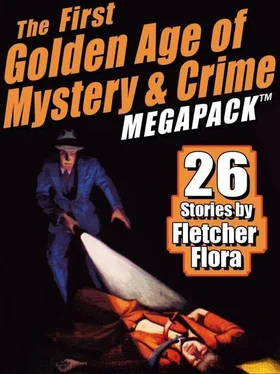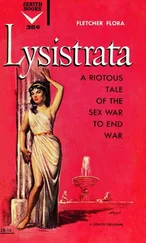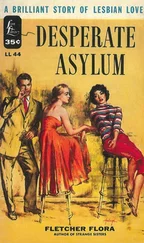Remembering the fright and the horror, Ruth shuddered in the bright warmth, the skin visibly crawling on her frail and wasting body. Turning away, she spread a vivid towel on the white sand and lay down upon it. She closed her eyes against the glare.
“But surely something can be done about it,” Kate said.
“Oh, yes.” Ruth’s eyes remained closed, her thin face haggard and old in the merciless light. “Something called hyposensitization. Injections of the allergen over a period of time. But one can never be certain that it will be effective in all instances. Only wait and see.”
Her fragmented speech was an effect of weariness. Waiting herself for death, alone and lonely wherever she was, she was resigned to waiting as an integral quality of truncated living.
How much time had passed?
Lying on the glittering beach beneath the high, hot sun, Kate raised her head and turned to see the frail body of her sister. Ruth’s thin arms were spread wide on the sand, as if open to receive the last precious degree of solar heat, and her meager bosom rose and fell in a rhythm of rationed breath. Kate had a sudden notion that she was in that instant slowly bleeding to death, her thin and colorless blood seeping away through an invisible wound into the hot absorbent sand. With a feeling of faint and fastidious revulsion, she turned her eyes again into the glare of the sun. Between the sun and her, a gull slanted to a landing. Higher and farther out, above the sea and between the beach and the remote, discernible curve of Earth, a small airplane dragged across the sky a series of connected letters that spelled out the name of a nightclub in downtown Miami.
Beside his observation tower, the lifeguard still posed for the blond in the bikini. She tilted her face and laughed with her lips stretched wide, and the sun struck sparks from her polished teeth. The little girl still dug in the sand just out of the reach of the climbing tide, and beyond the girl in the blue water of the Atlantic, moving slowly into Kate’s range of vision with an awkward flailing of arms, was the head of a swimming boy.
It was Little Jim, she saw, and he was really quite far out. Perhaps too far. It was apparent from his flailing strokes that he was not a strong or practiced swimmer, and the angle of his course was taking him steadily farther from shore. He seemed, moreover, to be swimming with intent, a steadfast purpose, as if he had set himself a goal this side of Cuba. And so he had. Ahead of him some ten yards, afloat on the water, was a shimmering blue balloon, a pale and delicate transparency of seductive beauty. A small boy, an innocent inlander, he was straining to reach and to hold a casual wonder of the miraculous alien sea.
Kate sat erect in the sand, her lean body tense and a cry of warning rising in her throat. The shimmering bauble, blown in by the winds, was a Portuguese Man-of-War, that strange drifter of tropical waters that trails below its seductive pneumatophore a colony of long filaments armed with powerful nettle-cells. The multiple stings of the Man-of-War, she knew, were capable of causing paralysis, and perhaps even, in rare instances, death. What would be their effect on a small boy who was critically allergic to the sting of a wasp?
If Little Jim should die, it will all come to you.
Was that Ruth’s voice? Hadn’t she said that? Had she now repeated the words, lying sick and wasted on her bright towel in the white sand, or were they an echo in Kate’s brain?
Down the beach, the lifeguard lifted his eyes with longing to the sun-soaked guests on the hotel terrace.
Close enough to touch, arms spread to embrace the warmth, Ruth whimpered like an uneasy child in her half-sleep.
Out in the blue water, the ten yards were now five.
Deliberately, her unuttered cry a stone in her throat, Kate lay back in the sand beside her sister.
The shadow of a gull passed over her closed eyes.
Originally published in The Man from U.N.C.L.E. Magazine , March 1966.
Mr. Cameron Fleming belonged to another age. In a time of sprawling urban growth, two-car garages and super-markets, he remained what he had always been, and what his father had been before him. He was, in brief, the sole and independent proprietor of a neighborhood grocery.
As a boy in better days, when his father had kept the store, he had fallen under the spell generated by that special and seductive mixture of scents peculiar to places where foods were gathered in the bulk, in barrels and boxes and jars and wooden tubs, and he had never escaped the spell.
It is true that the enchanting odor was gone now, or greatly diminished, but it was not gone from the memory of Cameron Fleming. In a mute and simple way, Cameron was a poet, and he had the poet’s capacity for intense recollection.
As everyone has realized at one time or another, there is nothing so tenacious as a remembered odor, nothing so calculated to bring back by association all the objects and events and emotions connected with it.
And that’s how it was with Cameron Fleming.
Every morning, when he unlocked the front door of his store and entered from the street, he could actually smell the magic effluvium of yesterday as surely as if the pickle barrel still stood, the tub of peanut butter still leaked the oily scent of goobers, and the hanging stalk of bananas still trailed a spoor of golden tropical fruit.
It was relatively late when Cameron married Millicent Hooker. He was, to be exact, thirty-two at the time. The marriage was hardly a success, but neither was it a disaster. It was merely dull.
Cameron was not greatly upset by the barrenness of his domestic life. He had the store, and the store was enough. For a time, that is. Until, to give a beginning to his decline, the day that Mrs. Hardy came in for a pound of round steak and a dime’s worth of onions.
Caroline Hardy was about Cameron’s age, about forty, but she was, so to speak, much older and younger at the same time. She had married young and lived hard and buried her husband, who had died at the age of thirty-eight, and she was tired. She did not, however, look tired. Neither did she look forty. She looked maybe thirty-five or thirty, depending upon the time of day and the degree of light and sometimes the character of the night before.
She was not actually pretty, and probably had never been, but she had magnetism and flair; even the simple gingham dress that she wore into the store was somehow, on her, like a party frock.
Cameron Fleming, approaching her, felt suddenly wistful, as if he had, after all, missed more in his life than he had known.
“Good afternoon,” he said. “May I help you?”
“I’d like a pound of round steak, please,” she said.
Behind the meat counter, he cut the steak and weighed it and wrapped it. Portent of the future, passing unnoticed, he gave her a pound and a quarter.
“Will there be anything else?”
“One large onion, please.”
“I’m afraid the onions aren’t large today. Two or three smaller ones, perhaps?”
“Two should be sufficient.” He selected two, the largest he had, and put them on the scales. They weighed out at twelve cents.
“That will be a dime,” he said, blowing his profit.
With her purchases in hand, she seemed loathe to leave. She looked slowly around her, and her pink lips formed the smile for which they were always prepared.
“What a perfectly charming store,” she said.
“Thank you,” he said. “It’s been in the family for years. My father ran it before me.”
“So much better, I think, than these great cold barns that pass for markets nowadays.”
“I’ve never had the pleasure of waiting on you before, have I?”
Читать дальше












